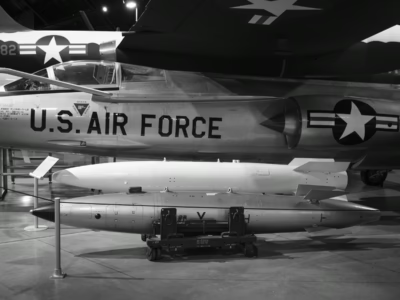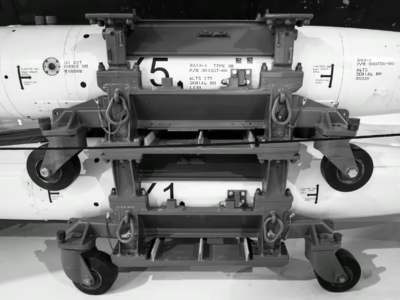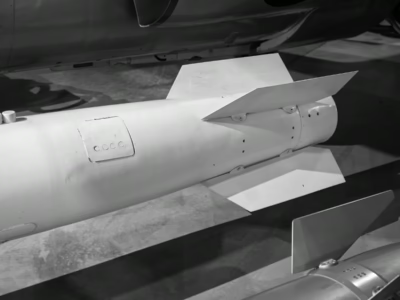Mark 43 Bomb
A small nuke to carry on small planes

The white bomb in the rear is the Mark 43 while the closer bomb is the practice version of the B61 nuclear bomb, the primary modern bomb in the US inventory and one of the bombs that replaced the Mark 43. These units are located at the National Museum of the US Air Force, In Dayton, Ohio.

About 2000 Mark 43s were produced, with a variety of fuzing options and reportedly coudl be dropped from as low as 300 feet (soee sources say 200 feet). In those cases they bomb would lay on the ground of a timed interval (to allw the plane to escape) before exploding. These units are located at the Wings Over the Rockies Museum, in Denver, Colorado.
Explosive Power
70 kt or 1 Megaton
Hiroshima Equivalent Factor
Up to 67x
Dimensions
13.6 ft. x 18 inches
Weight
2116 lbs.
Year(s)
1961–1991
Purpose
A tactical bomb carried by a large variety of aircraft
Nukemap
NUKEMAP is a web-based mapping program that attempts to give the user a sense of the destructive power of nuclear weapons. It was created by Alex Wellerstein, a historian specializing in nuclear weapons (see his book on nuclear secrecy and his blog on nuclear weapons). The screenshot below shows the NUKEMAP output for this particular weapon. Click on the map to customize settings.

Videos
Click on the Play button and then the Full screen brackets on the lower right to view each video. Click on the Exit full screen cross at lower right (the “X” on a mobile device) to return.
Further Reading
- Wikipedia
- The invaluable Pfeiffer Collection has Sandia’s 1968 “History of the Mk 43 Bomb.”
- A nice photo of the B-59 Convair Hustler in mid-flight with at least three practice Mark 43 bombs attached. Note the large centerline pod which could contain fuel as well as a high-yield thermonuclear bomb. Click on the photo to enlarge.
- This is a short video of a F-104 Starfighter “tossing” a Mark 43, a technique that allows the attacking plane additional time to exit the blast area. Of course, the smoke trail was utilized here simply to help viewers track the course of the bomb as it flies upwards (for a surprising amount of time) before slowing and beginning its descent.
- A graphic depiction of the relative sizes of various nuclear bombs. Scroll down for the “Mk 43.”
- During the Vietnam War, in December of 1965, an A-4E Skyhawk rolled off the deck of the aircraft carrier USS Ticonderoga during a training exercise. Attached to it was a live Mark 43 thermonuclear bomb set to its one-megaton setting. The pilot, plane, and bomb were never seen again. The incident became public in May of 1989. Far and away the best account of the story is from Delbert Mitchell, who was part of the crew that loaded the bomb onto the plane, published in 2019 by the Naval Institute Press. Note that many versions of this story claim that the plan was to launch the Skyhawk, which would immediately circle and land again. Mitchell says nothing about launching the plane, only that it would be loaded onto the carrier’s catapult before being brought back for unloading.
- Note the long user review by James S. Little, at Amazon, where he claims he was a witness to the accident and shares his recollections (e.g. that the sea was not calm on that day).
- At the link, scroll down to “0800058 – U.S. NAVY TRAINING FILM – MARK 43 AND MARK 57 WEAPONS – SHIPBOARD HANDLING, INCLUDING AIRCRAFT LOADING” for a text description of the matching video, above.

